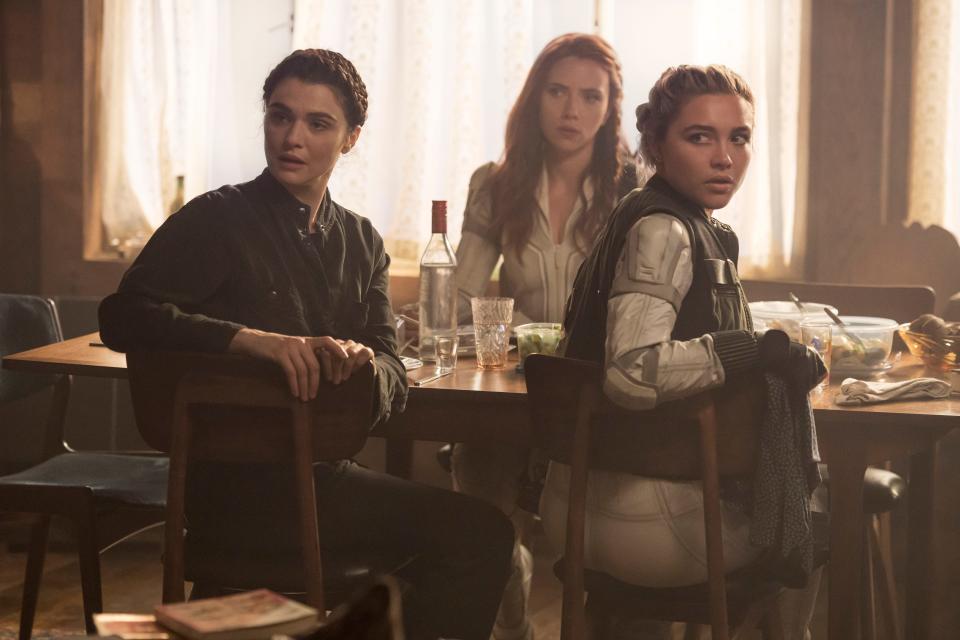'We could not have made this movie 10 years ago': How 'Black Widow' got real about trauma and abuse
There’s plenty of derring-do, superhero suits, explosions and huge mechanical contraptions falling from the sky in “Black Widow.” However, the newest Marvel movie breaks from its pack right from the start, with the harrowing images of young girls being taken away from their loved ones and subjected to frightening situations of human trafficking.
Watching the first 20 minutes of the movie, “I cried twice because it looked so real and so damaging,” says star Florence Pugh. “I never would have assumed that a film like this would be dealing with such deep and painful story lines, especially the abuse of the women and especially the capturing of young girls.”
The opening of “Black Widow” – which is already a box-office smash after its debut weekend – takes longtime Avenger Natasha Romanoff (Scarlett Johansson) and her little sister Yelena Belova (Pugh) back to their childhoods in America as part of a family of Russian secret agents. Pre-teen Natasha and 6-year-old Yelena are violently and suddenly removed from a cozy suburban lifestyle and taken to the Red Room, an organization that experiments on young girls and brainwashes them into assassins.
'Black Widow': Scarlett Johansson, Florence Pugh form superhero sisterhood, plan lasagna cooking videos

The two women reunite as adults for action-packed exploits and dysfunctional family drama yet also discuss their estrangement, past sins and shared trauma. And while fans have wanted a solo “Black Widow” movie for much of the decade Johansson spent as the main female face of the Marvel Cinematic Universe, she feels it comes at just the right time.
“We could not have made this movie 10 years ago,” says the "Avengers" star, who's also an executive producer on "Black Widow." “We really were able to make something that I feel reflects what's happening and it's been very rewarding."
The goal was to “have the Marvel universe intersect with reality,” says Cate Shortland, the first woman to be a solo director for a Marvel film. “So we talked about trafficking. We talk about women's reproductive rights in the film because they're things we care about. And instead of it being about victimization, the characters make jokes about it because it's happened to them. I hope that that lifts people up. The trauma the characters have been through, they're trying to come up and answer it, not let it put them down.”
Review: 'Black Widow' finally does justice to Scarlett Johansson's secret agent Avenger

Natasha’s childhood hardships have been mentioned in past films, most infamously in one scene in writer/director Joss Whedon’s “Avengers: Age of Ultron” in 2015. During an intimate moment, Natasha has a conversation with Bruce Banner (Mark Ruffalo), aka the Hulk, about having a romantic relationship. Bruce argues that he can’t have a normal life and kids since he's also a rage monster, while Natasha counters that she also is unable to have children because of the Red Room’s sterilization methods.
“It makes everything easier, even killing,” Natasha tells Bruce. “Do you think you’re still the only monster on the team?”
The scene landed with a thud and caught a ton of flak after the film’s release. But a memorable “Black Widow” sequence references the same subject – and goes down a lot more successfully – when the sisters bust their father figure Alexei (David Harbour) out of a Russian prison and Yelena smacks him in the face on their chopper ride out.
“Why the aggression? Is it your time of the month?” he says, leading to Yelena pointing out that she doesn’t get her period because she doesn’t have a uterus. “Yeah, that’s what happens when the Red Room gives you an involuntary hysterectomy. They kind of just go in and they rip out all of your reproductive organs,” she deadpans, leaving Alexei flabbergasted and wanting out of the conversation.
The dialogue was “the actresses and myself" countering screenwriter Eric Pearson after he inserted that unwanted period joke, Shortland explains. “And we said, ‘OK, you're going to write that, buddy? We're going to unleash Florence Pugh on you.’ ”
'Black Widow: The best order for viewing all 24 Marvel movies

Disney overall was supportive about “Black Widow” tackling issues other Marvel movies haven’t. Shortland recalls that when they screened the film for then-CEO Bob Iger very early on, “he said, ‘Can you please push it further, because it's really important that we talk about it.' "
Johansson agrees that “it’s very brave in a lot of ways that Marvel let us go there. They have a huge parent company (in Disney) and you don't know what kind of pushback you're going to get. We're talking about issues that are provocative and people are going to have feelings about them and it's to a wide audience.
“They understand the importance of their massive reach and that you can actually try to provoke some sort of collective consciousness about these very serious subjects.”
This article originally appeared on USA TODAY: 'Black Widow': How women pushed Marvel film to get real about abuse
